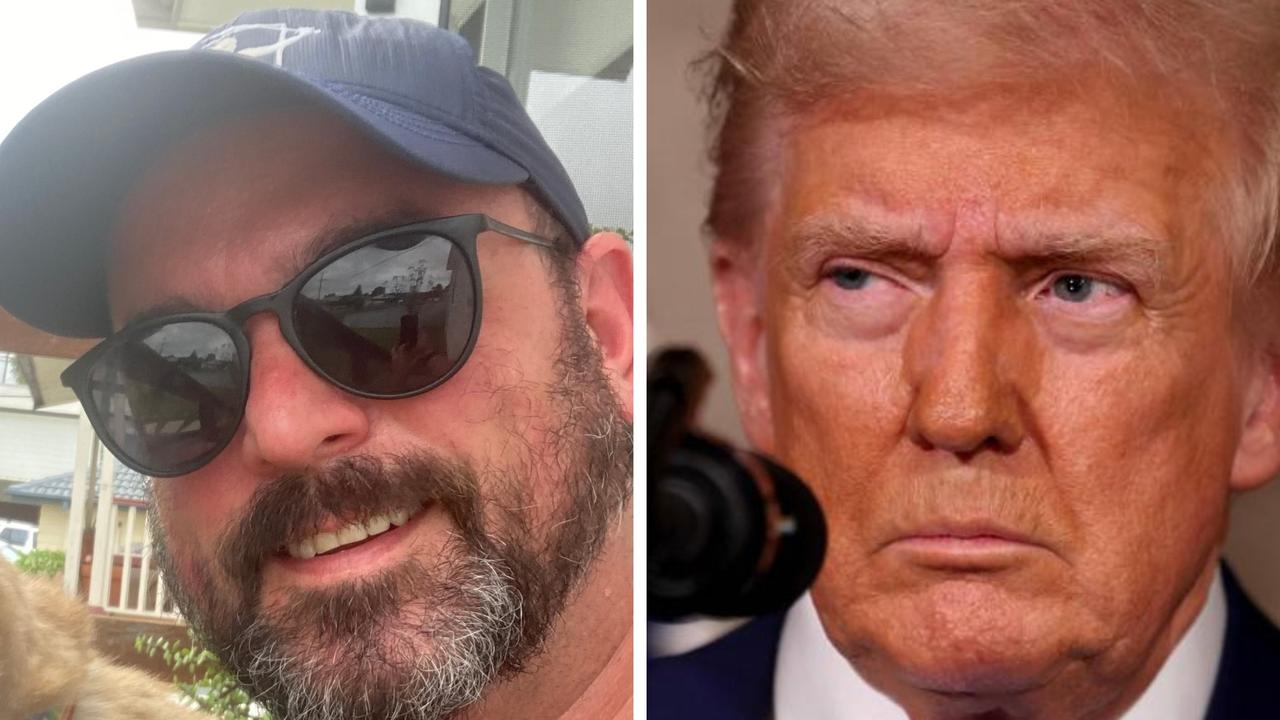Donald Trump suing Facebook, Twitter and Google, accusing them of violating First Amendment
Former US president Donald Trump is seeking revenge on the big tech companies that banned him by taking them to federal court.
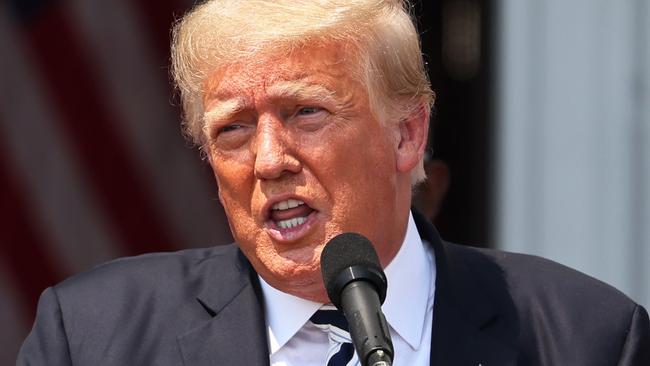
World
Don't miss out on the headlines from World. Followed categories will be added to My News.
Former US president Donald Trump is suing Facebook, Twitter and Google, accusing the tech giants of violating his right to freedom of speech.
Mr Trump is the lead plaintiff in a series of class action lawsuits, which also target the companies’ CEOs Mark Zuckerberg, Jack Dorsey and Sundar Pichai.
Announcing the legal action at his golf club in Bedminster, New Jersey today, he said the companies had become a “de facto censorship arm of the US government”.
“We’re demanding an end to the shadow banning, a stop to the silencing and a stop to the black-listing, banishing and cancelling,” said Mr Trump.
“Our case will prove this censorship is unlawful, it’s unconstitutional, and it’s completely un-American.”
RELATED: Donald Trump’s Facebook ban upheld
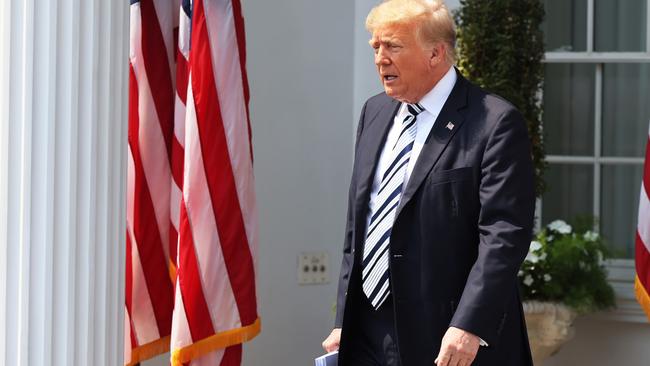
Mr Trump is currently banned from posting on Facebook, Twitter and YouTube, which is owned by Google.
He was suspended from the platforms after the Capitol riot on January 6, in which a mob of his supporters violently stormed Congress in an attempt to stop it from certifying Joe Biden’s victory in the 2020 election.
The social media companies said Mr Trump had used their platforms to spread misinformation about the election. In banning him, they cited the risk of his rhetoric inciting further violence.
The Twitter ban is permanent, while Facebook’s will last until at least January of 2023.
“There is no better evidence that big tech is out of control than the fact that they banned the sitting president of the United States earlier this year, a ban that continues to this day,” Mr Trump said today.
“If they can do it to me, they can do it to anyone. And in fact, that is exactly what they are doing.”
The First Amendment to the US Constitution prevents the government from “abridging the freedom of speech”.
However Facebook, Twitter and Google are private companies. Mr Trump’s lawsuits seek to get around this by arguing that all three are “state actors”.
For example, this is what the suit against Facebook says.
“Defendant Facebook has increasingly engaged in impermissible censorship resulting from threatened legislative action, a misguided reliance upon Section 230 of the Communications Act, and wilful participation in joint activity with federal actors,” it says.
“Defendant Facebook’s status thus rises beyond that of a private company to that of a state actor. As such, defendant is constrained by the First Amendment right to free speech in the censorship decisions it makes regarding its users.”
Section 230 of the 1996 Communications Decency Act gives internet platforms broad exemptions from legal liability for the content their users post online.
It also allows social media companies to regulate the content on their platforms, as long as they act “in good faith”.
This means they can remove or restrict content they determine is “obscene, lewd, lascivious, filthy, excessively violent, harassing, or otherwise objectionable, whether or not such material is constitutionally protected”.
That provision of the law is what allows the social media sites to remove content and, in cases like Mr Trump’s, suspend users.
Mr Trump has repeatedly called for Section 230 to be repealed. So has Mr Biden, though for different reasons.
Republicans argue the law allows companies to censor conservatives, while Democrats believe it allows them to avoid combating hate speech, knowing they will not be held liable for it.
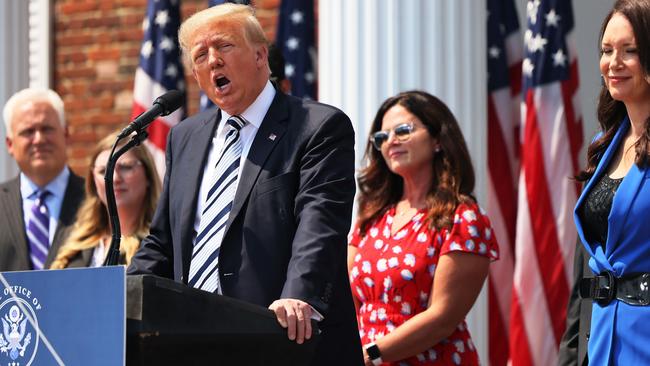
Mr Trump’s lawsuits say the authority given to tech companies under Section 230 to moderate their platforms is unconstitutional.
“Plaintiff respectfully asks this court to declare that Section 230 on its face is an unconstitutional delegation of authority,” the suit against Facebook says.
It asks the court to prohibit Facebook from “exercising censorship, editorial control or prior restraint in its many forms over the posts of President Trump” and other users.
In arguing that Facebook is a “state actor”, Mr Trump’s lawyers claim Democratic politicians “coerced defendants to censor” him because they “feared his skilled use of social media as a threat to their own re-election efforts”.
“The message conveyed by Democrat legislators to defendants was clear: use the authority of Section 230 to ban Plaintiff and those (other plaintiffs) who posted content and view contrary to these legislators’ preferred points of view or lose the competitive protections of Section 230 and tens of millions of dollars of market share altogether,” they say.
They also cite Facebook’s work with the federal government to “curb the spread of vaccine misinformation”.
“Defendants acted to censor other medical opinions that did not uphold that narrative of Dr (Anthony Fauci) and the Centres for Disease Control and Transmission, which took on both a political and medical nature, given the interconnection between government policy and science,” says the suit.
“When Facebook states or implies that users who espouse a different narrative regarding the safety and efficacy of the vaccination are spreading ‘false’ information, it is an act of bad faith. It is necessary in society for people to have a robust exchange of ideas, yet Zuckerberg and Facebook have worked closely with government actors to silence any opposing views.”
In other words, because Facebook and the other companies have co-operated with the government to clamp down on anti-vaxxer misinformation, they should now be considered state actors.
Mr Trump is seeking damages, an order for the tech companies to immediately reinstate his accounts (along with those of the other plaintiffs), an order for the companies to remove their misinformation warning labels on Mr Trump’s posts and desist from making any further warnings in the future, and a declaration that Section 230 is unconstitutional.
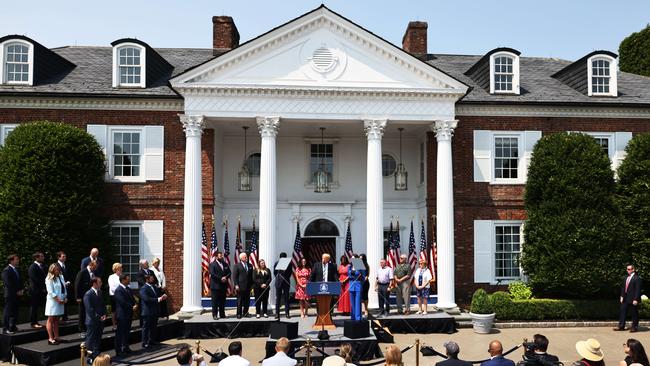
Legal experts are, it’s fair to say, sceptical of Mr Trump’s chances here.
One problem: courts in the United States have repeatedly held that social media platforms are not state actors. One such judgment was issued just a couple of weeks ago.
“The First Amendment does not apply to non-governmental actors. Full stop,” said Steve Vladeck, a professor of constitutional law at the University of Texas.
“The ‘state action’ doctrine is about as firmly embedded a principle of constitutional law as there is. To overturn it would have incredibly broad consequences – many of which the current Supreme Court would be loath to embrace.”
NBC legal analyst Barb McQuade, a professor at Michigan Law School, said “Trump and his lawyers need to read the first line of the First Amendment”, which specifies that “Congress shall make no law” restricting the freedom of speech.
Former federal and state prosecutor Elie Honig, now a CNN legal analyst, made the same point.
“The very first word of the First Amendment is ‘Congress’. That means the First Amendment applies to governmental actors, not private companies,” said Mr Honig.
Harvard University law professor Laurence Tribe said Mr Trump “has the First Amendment argument backwards”.
“Facebook and Twitter themselves have a First Amendment right to decide what speech their platforms amplify – a right that includes excluding speakers who incite violence,” he said.
David Greene, a First Amendment professor at the University of South Florida, suggested the lawsuits would fail.
“All of these arguments have been raised, and have been rejected, in other cases. That doesn’t necessarily mean that they will lose this time. But lots of other cases, with frankly better facts, have lost,” said Prof Greene.
When paragraph 3 of your lawsuit declares Facebook is the government pic.twitter.com/uvzAJ9BScN
— Devlin Barrett (@DevlinBarrett) July 7, 2021
“Congress†shall make no law … Trump and his lawyers need to read the first line of the First Amendment. His lawsuit complaining of censorship against private social media companies and their leaders is going nowhere. https://t.co/Va6vNhWxpO
— Barb McQuade (@BarbMcQuade) July 7, 2021
These are remarkably frivolous complaints. Social Media companies aren't bound by the First Amendment. They enjoy First Amendment protection. This is the kind of "fighting" that's typical to Trumpism, a temper tantrum that makes your opponent stronger. https://t.co/cpQ09lzC6C
— David French (@DavidAFrench) July 7, 2021
And conservative lawyer George Conway, who I should note is (very) anti-Trump, was particularly harsh.
“I’ve skimmed the former guy’s complaint against Facebook and it’s every bit as stupid as you’d think it is,” said Mr Conway.
“It’s insane enough that he’s claiming Facebook’s a state actor. Yes, in extreme cases, if otherwise non-state actors are acting in cahoots with the government, they can become state actors. But that’s an absurdly hard thing to show, and nothing like that occurred here.
“But what makes this meta-insane is that he’s claiming that Facebook was a FEDERAL state actor because it was entangled with the FEDERAL government at a time when HE WAS PRESIDENT OF THE UNITED STATES.”
Emphasis his.
Originally published as Donald Trump suing Facebook, Twitter and Google, accusing them of violating First Amendment



